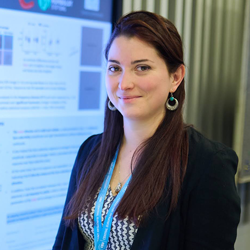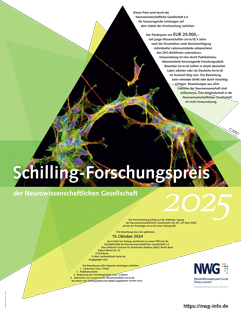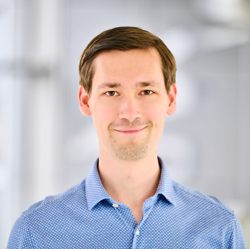We are excited to announce that both Diane Rekow and Lukas Kunz are the winner of the NWG Schilling Research Award 2025. They each impressed the jury so much with their outstanding applications that the decision was made to split the prize for the first time in history.
|
|
The Schilling Research Award of the German Neuroscience Society 2025 was bestowed on Diane Rekow, Post-doc and Alexander Humboldt Fellow at the Biological Psychology and Neuropsychology lab of the University of Hamburg. In humans, the sense of sight is considered to dominate our perception, particularly thanks to its high spatial and good temporal precision. However, vision is a slow-developing sense and the first months of life are rather dominated by other senses. Notably, the sense of smell, with its early functional onset, appears well-suited to support visual development within the first year of life. To which extent is olfaction shaping early visual cognition was however unknown. Diane Rekow used electroencephalography (EEG) in humans, and in particular a special method known as “frequency tagging”, to understand the effect of maternal body odor over face and non-face visual categorization in young infants. She discovered that maternal odor enhances face-selective, but not non-face-selective, visual responses in 4-month-old infants. Furthermore, this influence actively participated in eliciting a face illusion: infants with the weakest visual responses showed the strongest enhancement from odor cues. Then, in infants aged 4 to 12 months, she found that the olfactory-visual interaction for faces decreases with age, aligning with the principle of inverse effectiveness, which states that multisensory integration is stronger when unisensory perception is weaker. This suggests a priming effect of odor cues, enhancing sensitivity in neural networks during early development but becoming less critical as visual processing matures. These findings underscore that the infants’ brains integrate multisensory cues (like odor and vision) to form coherent perceptions, even with complex stimuli. In parallel, Diane Rekow also demonstrated that body odors selectively tune face-processing areas in the adult brain. This interaction effect was found in particular when a face illusion was explicitly reported, suggesting a link between odor cues and the conscious awareness of visual perception. Overall, her findings highlight a significant role of olfaction in visual cognition and its development, particularly under conditions where visual input is ambiguous as with illusions, and could help understanding neural plasticity under typical and atypical sensory development. Diane Rekow completed her PhD in Psychology and first post-doctoral research at the University of Bourgogne, France. She next obtained an Alexander von Humboldt Fellowship to conduct research in developmental cognitive neuroscience at the University of Hamburg, Germany, extending her research to also include clinical groups.
|
|
|
The Schilling Research Award of the German Neuroscience Society 2025 was bestowed on Lukas Kunz, Junior Professor and Research Group Leader at the Department of Epileptology at the University Hospital Bonn. Spatial navigation and spatial memory are an important part of our daily lives. The underlying neural mechanisms in the human brain remain unclear, however. New scientific discoveries in this field would expand our understanding of the human brain and provide insights into the causes of memory loss and disorientation in neurodegenerative diseases such as Alzheimer’s disease. Lukas Kunz receives the Schilling Research Award of the German Neuroscience Society 2025 for his work on the neural foundations of spatial navigation and spatial memory in humans. His research is based on the unique opportunity to record the activity of individual neurons during spatial memory tasks in epilepsy patients—a method that is only possible at a few specialized epilepsy centers worldwide. Through these single-neuron recordings, he was able to show that neurons in the human temporal lobe represent directions and distances during spatial navigation. Furthermore, he found evidence that brain oscillations coordinate the activity of individual neurons encoding spatial and visual information, supporting the formation and retrieval of spatial memories. Additionally, in translational studies using functional magnetic resonance imaging, he demonstrated that an increased risk for Alzheimer’s disease is associated with changes in brain activity patterns during spatial navigation tasks. These findings contribute to a deeper neuroscientific understanding of spatial navigation and memory in humans and may help develop early biomarkers for neurodegenerative diseases. Lukas Kunz studied medicine and philosophy at the University of Bonn and completed his doctoral studies in medicine and biology at the Universities of Bonn and Freiburg. He then conducted postdoctoral research at the University Medical Center Freiburg and Columbia University in New York City. Since 2023, he has been a Research Group Leader and Junior Professor of Cognitive and Translational Neuroscience at the University Hospital Bonn.
|



